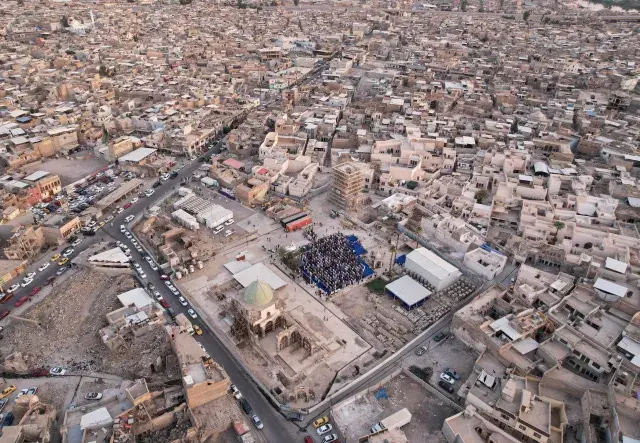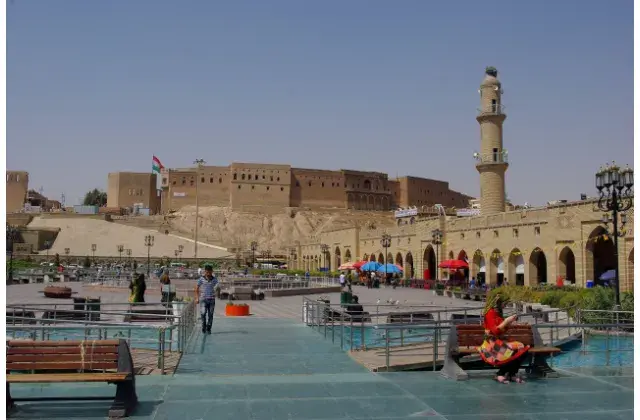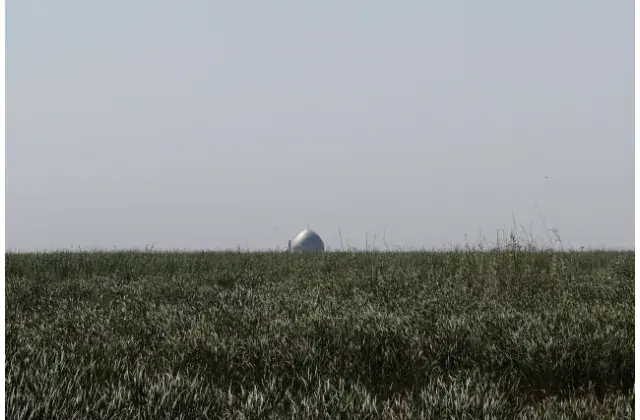The Liberation of Mosul (2014 - 2023)

In December 2013, the terror organisation the Islamic State of Iraq and the Levant (ISIL, later IS) intensified its activities in Iraq, particularly in Anbar province, leading to clashes with Iraqi forces and tribal militias. In January 2014, ISIL captured Fallujah and parts of Ramadi, though the latter remained contested. In June 2014, IS launched a major offensive, seizing Mosul on June 10 and Tikrit on June 11. At the end of June 2014, the Islamic State declared the establishment of a caliphate on June 29 and named Abu Bakr al-Baghdadi as its caliph, asserting control over significant territories in northern Iraq and Syria. The terror inflicted by ISIS, particularly against civilians and religious minorities, was catastrophic, including the enslavement of thousands of Yazidis, mass killings for different ethnic groups, and forced conversions. ISIS also destroyed key infrastructure, archaeological treasures, and historical monuments in its campaign of brutality. The occupation had caused the displacement of nearly six million Iraqis – around 15 % of the entire population of the country. The Islamic State of Iraq and the Levant (ISIL) was successful because of the weakness of the Iraqi forces and former Prime Minister Nuri al-Maliki’s dishonest restraint. When ISIL captured Mosul, Grand Ayatollah Ali al-Sistani issued a fatwa calling upon Iraqis to join the Iraqi security forces to help repel the IS threat. When ISIL captured Mosul in June 2014, Grand Ayatollah Ali al-Sistani issued a fatwa urging all Iraqis to take up arms in defence of the nation. This call to action led to a wave of mobilisation, with volunteers joining both the Iraqi security forces and various paramilitary groups. These groups were later unified under the Popular Mobilization Forces (PMF), which became an integral part of Iraq’s military and played a critical role in the fight against ISIL.
Due to internal and external pressure, Nuri al-Maliki resigned and Haider al-Abadi took over on 14 August 2014. On 7 April 2015, Haider al-Abadi placed the PMF under the direct command of the prime minister’s office, giving the organisation an official status, which included a payroll. On 16 October 2016, Haider al-Abadi declared the beginning of the assault to recapture the city of Mosul. The Battle of Mosul was a major military campaign by the Iraqi Government forces with PMF, the Kurdistan Regional Government (KRG) with its Peshmerga and international forces, to defeat ISIL. On 10 July 2017, an official declaration of victory for Mosul was proclaimed and on 9 December 2017 Iraq declared final victory over the Islamic State.
During its occupation of northern Iraq, ISIL caused extensive damage to or destroyed many cultural heritage sites. A comprehensive reconstruction began, including with international support. One internally displaced camp after another was able to be closed and the majority of people could return. Extensive programmes were carried outl. In February 2018, UNESCO initiated the campaign “Revive the Spirit of Mosul.” The initiative aims at the reconstruction and recovery of the city and is conceived in partnership with the Iraqi Government. The programme addresses three main pillars: Heritage, Cultural Life and Education. The campaign is supported by a huge international community. The most emblematic project of the Heritage pillar is the reconstruction of al-Nuri Mosque and its minaret al-Hadba, which is additionally supported by the United Arab Emirates. Other heritage projects encompass al-Aghwat Mosque, al-Saa'a Convent and al-Tahera Church. The reconstruction of houses and schools is a cooperation with the European Union. 124 historic houses in the old city of Mosul could be rebuilt. The pillar of Cultural Life concerns a comprehensive plan to restore cultural life and institutions. The Institute of Fine Arts was reconstructed and a filmlab established. In partnership with the NGO Action for Hope the programme “Listening to Iraq” was launched. From 24 to 27 March 2022, the “Mosul Traditional Music Festival” took place. Following a holistic approach of redevelopment, UNESCO launched the project “Prevention of Violent Extremism through Education” (PVE Education) addressing primarily school teachers and principals. The programme includes the needs of refugees, the displaced and tries to reduce risks of children by raising awareness about leftover ordnance and mines. For adults, UNESCO had launched a very much needed technical and vocational education and training programme (TVET). Another training programme responded to the needs of heritage professionals and craftsmen.
This article was written by Hella Mewis and is licensed under CC BY-NC 4.0.






